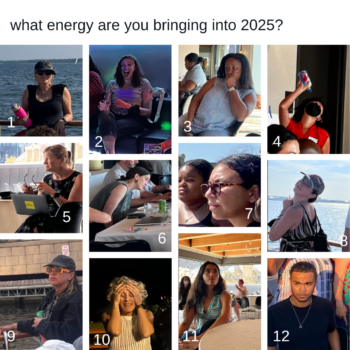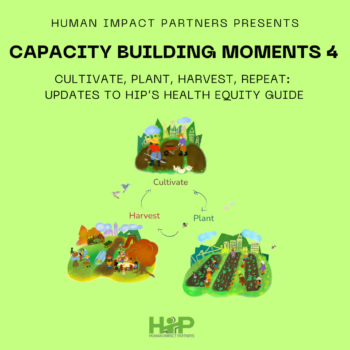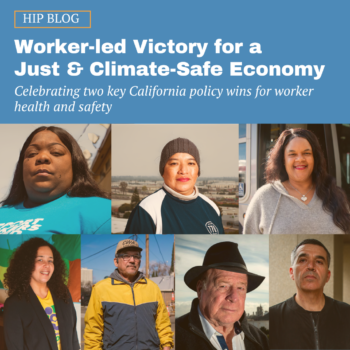| By Lili Farhang |
Today, Human Impact Partners, Esperanza Community Housing, Strategic Action for a Just Economy and other members of the UNIDAD Coalition are releasing the executive summary of the report Assessing Health and Equity Impacts of the Proposed Reef Development Project in South Central Los Angeles. Our report finds that the proposed Reef Development Project, as currently designed, will place thousands of neighborhood residents at high risk of financial strain or displacement, which could negatively impact their health in many ways.
The Reef Development Project plans for the total renovation and expansion of a commercial area in South Central Los Angeles, and would cover 9.7 acres of land. It includes a 208-room hotel, two high-rise condominium towers, 528 mid-rise residential units, and 21 low-rise live/work residential units. This project is meant to be big. And with big projects come big impacts.
We found that an estimated 4,445 renters who live within ½ mile of the proposed Reef Development Project are already experiencing housing cost burdens and could be at high risk of financial strain or displacement as a result of the development. An additional 39,311 renters who live between ½ mile and 2 miles of the project could be at moderate risk. Overall, 52% of the nearly 84,000 residents living within 2 miles of the project could be at risk of financial strain or displacement as a result of the Reef Development Project.
Residents of the neighborhood came to South Central seeking economic opportunity, and built a thriving community. Over time, however, the city began to engage in a variety of different policies that led to increased segregation, concentrated poverty, and limited opportunity. This was followed by prolonged civic disinvestment that has perpetuated poverty and segregation to this day. Displacement and financial pressures from the Development Project will happen within the context of ongoing challenges with housing affordability and homelessness that are happening in the area. Focus group participants from the area anticipated they may become homeless.
“I keep thinking, ‘What am I going to do if this doesn’t work out? Where am I going to go? Am I going to see my neighbors again? Where am I going to find this kind of community again? Going to have to start over. Going to be homeless, without a family.’” –Anayetzy
Residents are already struggling intensely to afford housing, and are engaging in a variety of methods to address this problem: by making difficult choices on what necessities to do without, by living in overcrowded and substandard housing, and by looking for additional sources of income. Despite these challenges, residents and small business owners in the neighborhood have developed strong social ties and a sense of attachment to the area, and they want to stay. Many of the residents and businesses in South Central have been in the neighborhood for 10-20 years or more.
Community residents who experience financial strain and/or displacement may experience a wide variety of chronic stress-related physical and mental illnesses, including anxiety, depression, hypertension, heart disease, obesity, diabetes, and sleep disorders. Additional constraints on health-protecting resources and exposures to health-damaging environments such as substandard and overcrowded housing could further contribute to a variety of negative health outcomes. Disruption of social networks can lead to additional health challenges, including exposure to fragmented social environments that have higher rates of violence and sexually transmitted diseases.
Based on these findings, our primary recommendation to the City and project developers is that the Reef Development Project presents a unique opportunity to engage in a cutting-edge trauma-informed approach to community development. Trauma Informed Community Building (TICB) is a new innovative approach to development that recognizes the existing community as assets and proposes that these assets—or people—are considered the building blocks for the future. We recommend that the developer and the City work together to ensure that the Reef Development Project is developed using the four guiding principles of TICB: 1) Do no harm, 2) Acceptance, 3) Community empowerment, and 4) Reflective process.
In addition, the report makes a series of recommendations to:
- Produce and protect affordable housing
- Prevent displacement
- House and protect the homeless
- Create good jobs and career pathways for local residents
- Support small businesses
- Maintain public transit use by local residents
- Protect the safety and security of the community
- Provide green space for neighborhood residents
The report was produced in partnership with Advisory Committee members from: Community Development Technologies, TRUST South LA, Physicians for Social Responsibility – Los Angeles, Natural Resources Defense Council, Public Counsel, St. Francis Center, Advancement Project, All People’s Community Center, Los Angeles County Public Health Department, Occidental College, and a community advocate/column writer.
The report was released at a press event today in Los Angeles. Speakers included:
- Jim Mangia, MPH, President and CEO of St. John’s Well Child & Family Center
- Holly Avey, Human Impact Partners
- Cynthia Bryant, local business owner, student and resident
- Erendira Morales, local resident
- Beatriz Solis, The California Endowment
- Benjamin Torres, President and CEO of CDTech
Visit www.humanimpact.org or unidad coalition website for the executive summary (English), executive summary (Spanish), full report (English), full report (Spanish), and links to a series of blog posts about the project.




